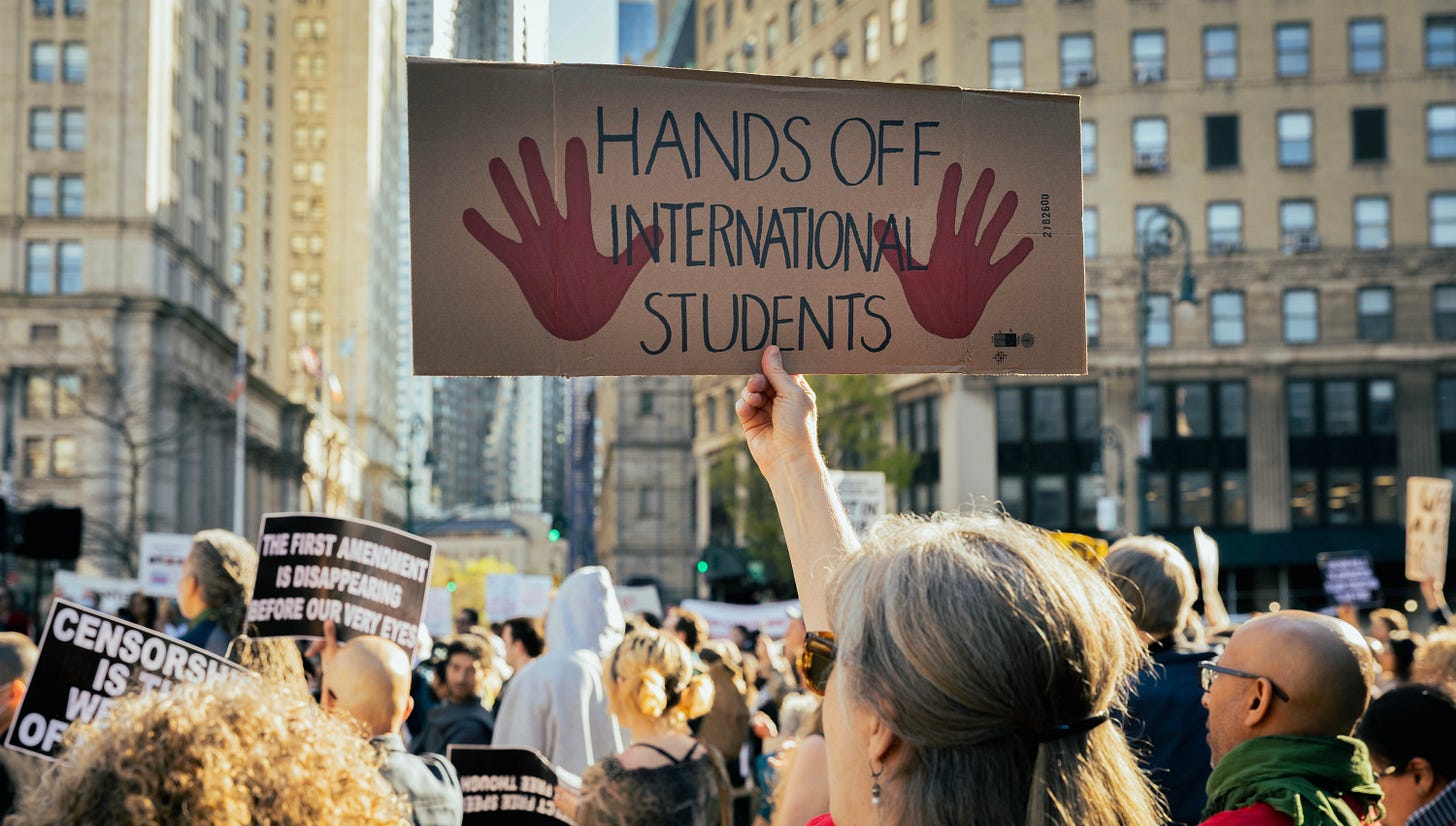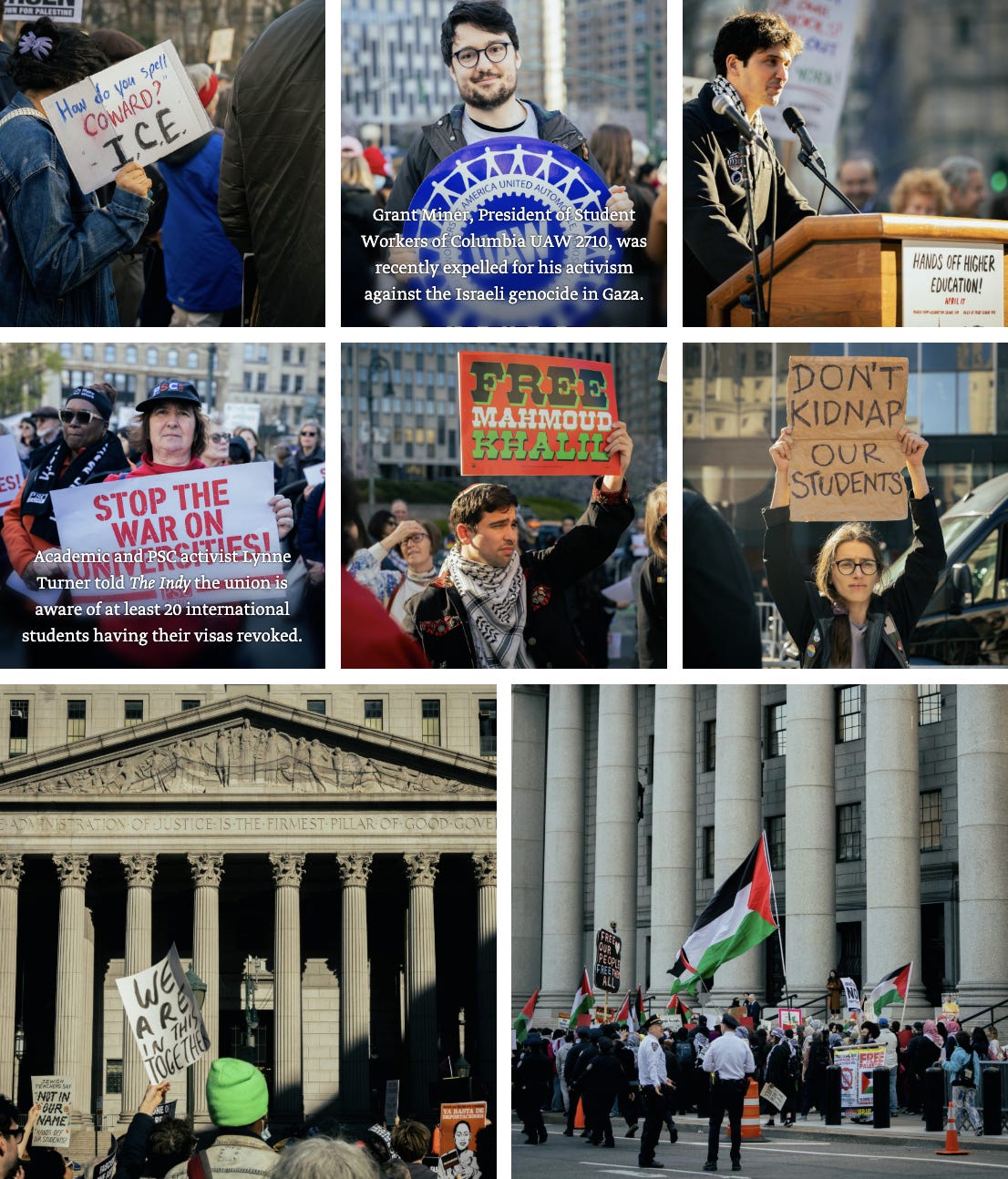Conservatives have wanted to subordinate American universities for decades. From their vantage point, your average college campus is a bastion of progressivism where heretical questions about American greatness are embraced and new generations of activists are minted. All the worse is the Ivy League, whose privileged students often go on to play roles at leading U.S. institutions. The reality is more complicated. Universities, public and private, have been increasingly captured by corporate and big-money interests for a generation or more. Their top officials tend to be cautious managers, not bold, imaginative leaders. Many students are more concerned with getting a good job than changing the world.
Still, the Gaza solidarity encampment movement that erupted on college campuses last spring showed a radical spirit of dissent was still alive. When university administrators, egged on by politicians from both parties, branded the demonstrators as violent Jew-haters and unleashed the police on them, it created an opening that the Trump administration has ruthlessly exploited.

Billions of dollars in federal research grants have been withheld from some of the nation’s most prestigious universities in the name of fighting antisemitism. Trump has also demanded government oversight of who universities hire and what they teach. On Monday, Harvard, the world’s wealthiest and most powerful university, thrilled the academic world when its leadership, at long last, told the president in so many words to take his ransom note and shove it.
Counting on management to do the right thing in a time of rising authoritarianism is a shaky proposition at best. On Thursday, higher education unions from the City University of New York, Columbia, NYU, New School, Fordham, FIT and St. Johns rallied in Foley Square in lower Manhattan. “It’s our time. We didn’t ask for this. We don’t deserve this, but we will meet the moment,” promised James Davis, president of the faculty union at CUNY.
Support The Indypendent today!
Higher Ed Unions Rally in Foley Square, Vow to ‘Meet the Moment’
By Sam Alcoff
Photos by Lantz Arroyo.
Against the granite columns of the New York County Courthouse in Lower Manhattan, hundreds of professors, students, school staff and alumni rallied yesterday afternoon in defense of higher education.
Less than 100 days into Trump’s second term, his administration has attempted to take control of multiple elite universities, abducted several prominent student activists and created a chilling effect on campuses across the country. "We need teachers; we need books!" chanted the well-educated crowd. "We need the money the billionaires took!"
"I've watched with utter horror as Columbia University has stood by, handed its students over to ICE and destroyed the university in the process," a Columbia University academic told The Indypendent. This non-unionized contingent faculty member, who did not want to give their name for fear of reprisal, added, "A lot of the people who have the most to lose, who have the least protection in the University, have been the people who have stood out the most fiercely and put themselves on the line for their students."
"At Columbia University, we received a $400 million ransom note with a whole set of demands like 'put this department under academic receivership,' 'expel these students,'" said Grant Miner, President of Student Workers of Columbia UAW 2710. Miner, who was recently expelled for his activism against the Israeli genocide in Gaza, added that the university administration "acquiesced to that, but the $400 million is still not back."
Columbia's capitulation was countered earlier this week when Harvard University President Alan Garber publicly rejected the government's attempts to control the university's hiring, admissions and education. The Trump administration has since threatened the school's government contracts, nonprofit tax status and even its ability to admit international students. Though admiring of Garber's principled stand, numerous activists Thursday pointed out the differing circumstances for elite universities: Not every school has Harvard’s $53 billion endowment.
Jewish elders in SEIU purple mingled alongside the militant City University of New York students holding signs high along the perimeter of the rally. The atmosphere of solidarity and support in Foley Square stood in stark contrast with campuses fractured by divisions historic and fresh. For years, tenured professors and precarious adjuncts alike have debated pedagogy amid crippling student debt under increasingly corporate university administrations. As Trump goes after schools under the pretense of fighting antisemitism, faculty and students are in the difficult position of ostensibly defending the same schools that have fired, suspended and expelled many of them.
“Antisemitism is a real thing, but a group of white supremacists are not the people that are really interested in protecting Jews,” pointed out Professional Staff Congress-CUNY’s vice president Jennifer Gaboury.
Local politicians attended the protest to voice support. New York City Public Advocate Jumaane Williams, once a CUNY student activist himself, was quick to criticize Mayor Eric Adams’ role in criminalizing protesters while facing his own legal troubles. Dubbing Adams “the deputy president of the city for Donald Trump,” Williams acknowledged the bipartisan failure of the moment. “We're in a dangerous situation. We don't have the leaders we need to help protect New Yorkers right now,” he added, appreciating the energy and courage of younger activists.
Pamela Sporn of New York City Jewish Elders acknowledged support from politicians but counseled against reliance on elected officials. “We never looked at the politicians for our protection. That's not where the protection is going to come from,” said Sporn, a filmmaker and retired CUNY adjunct whose own father was persecuted during the Red Scare. “The protection is going to come from each other. I visited the encampment at City College; it was beautiful. And I came up in a student movement of the early ’70s. We fought against apartheid in South Africa, so it's always us. It's togetherness. My father was called before [the House Un-American Activities Committee] in 1964. They organized in the community, and they organized on the campus and had pickets beforehand. That's what this is about; this is about not waiting for the continued repression to come. It's [about standing] up."
That community certainly came out in Foley Square. Far above the crowd on the courthouse eave is etched “The true administration of justice is the firmest pillar of good government.” As the Trump administration moves to crush any institution that it doesn’t control, students and professors recognized the dearth of justice as a potentially teachable moment.
"It's our time. We didn't ask for this. We don't deserve this, but we will meet the moment," promised PSC president James Davis from the lectern. From schools across the city, the applause was immediate.
John Tarleton contributed reporting.





